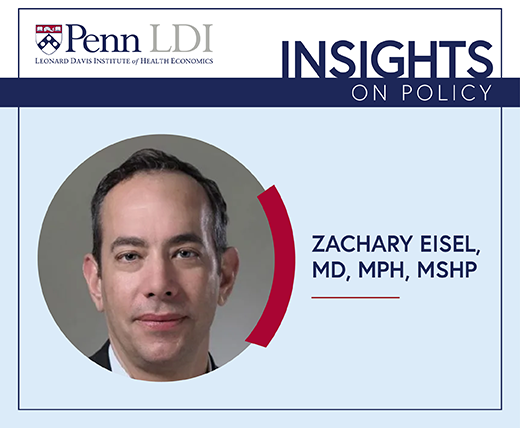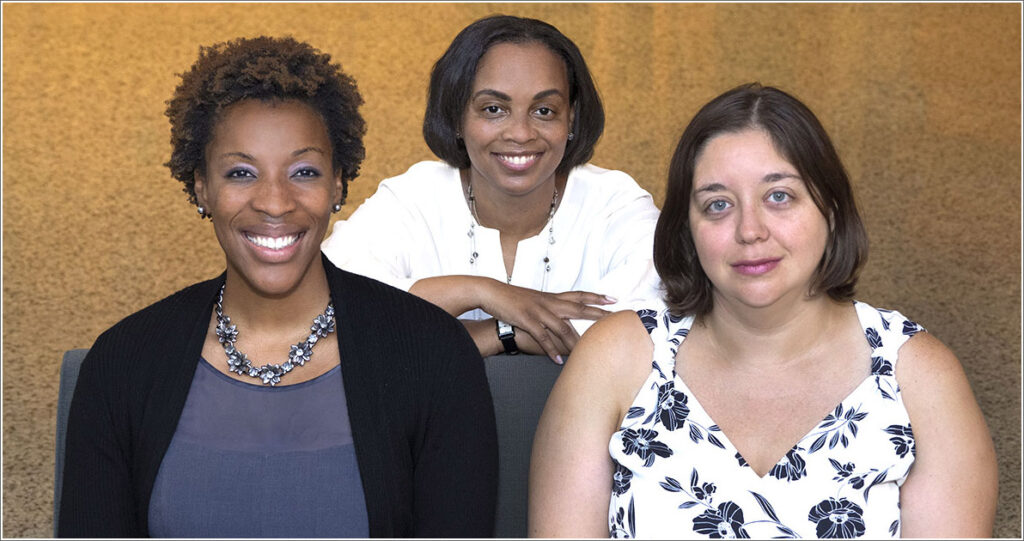
Estimated Overdose Deaths Due to the Loss of MOUD in the One Big Beautiful Bill Act
Research Memo: Delivered to House Speaker Mike Johnson and Majority Leader John Thune
Health Equity | Improving Care for Older Adults
News

The University of Pennsylvania’s Center for Improving Care Delivery for the Aging (CICADA) has announced three new postdoctoral and junior faculty to become the program’s second cohort of CICADA Scholars, pursuing pilot research and receiving training and mentorship in health services research.
Established on the Penn campus a year ago, CICADA is funded through a 5-year grant from the National Institute on Aging (NIA) as a new Resource Center for Minority Aging Research (RCMAR).
CICADA is a multidisciplinary research initiative aimed at improving the diversity of the health services research (HSR) workforce studying aging and health care issues.
The three new grantees for the 2019-2020 CICADA cohort are:
Nwamaka Eneanya, MD, MPH, an attending nephrologist and Assistant Professor of Medicine at Penn’s Perelman School of Medicine, who will be studying the racial differences in advance care planning among nursing home patients with moderate and advanced chronic kidney disease.
Salama Freed, PhD, MA, MS, an LDI Associate Fellow and Postdoctoral Researcher at LDI and the Perelman School’s Department of Medical Ethics and Health Policy, who will be studying the effect of providing publicly available information on nursing home quality on competition between long-term Nursing Home and Assisted Living Facility operators.
Eleanor Rivera, PhD, RN, an LDI Associate Fellow and Postdoctoral Fellow at the NewCourtland Center for Transitions and Health at Penn’s School of Nursing, who will be studying the unique ways chronic kidney disease patients perceive and understand their disease based on lived experience, a process clinically called “illness representation.”
“We are excited to be moving into our second year of this CICADA work and to have these three talented health services researchers join us,” said CICADA Co-Director Rachel Werner, MD, PhD. Co-director Allison Willis, MD, MS, added, “We look forward to mentoring these promising scientists as they work toward a sustained career in aging research, in line with the overall goal of this initiative — to improve the health, wellbeing, function and independence of older adults.” Werner is a Professor at both the Wharton School and the Perelman School of Medicine; Willis is an Associate Professor at Perelman.
Launched in 1997 with centers at a handful of universities, the NIA’s national RCMAR program has18 research and training facilities at universities across the country. Each center focuses on a different aspect of aging and health care. Penn’s is one of a few that focus on the discipline of health services research, the study of how health care delivery is organized, financed, managed, quality-controlled, and regulated.
The essential goal of RCMAR is to recruit, mentor, and develop minority junior faculty members into accomplished research scientists, a process that begins with pilot research projects they undertake with their mentors. Since its founding 21 years ago, more than 400 research scholars have come through the RCMAR program, most going on to academic research careers.
The broad RCMAR programs are informed by the fact that underrepresented researchers bring essential diverse perspectives and, often, personal experiences to bear in understanding the social, economic, political, and environmental determinants of racial and ethnic disparities in health and health care. According to the federal Office of Minority Health, underrepresentation in research leads to underfunding of health research as well as a lack of culturally appropriate theories, models, and methodologies.
The CICADA program is facilitated through LDI and, through LDI’s network and infrastructure, links to all of Penn’s 12 schools. CICADA scholars and mentors are drawn from across the University, creating an interdisciplinary approach to training.

Research Memo: Delivered to House Speaker Mike Johnson and Majority Leader John Thune

Research Memo: Delivered to House Speaker Mike Johnson and Majority Leader John Thune

Hospitals’ Current Cost Reports are Unreliable and Should be Improved, LDI Fellow Finds

If Federal Support Falls, States May Slash Home- and Community-Based Services — Pushing Vulnerable Americans Into Nursing Homes They Don’t Want or Need

Historic Coverage Loss Could Cause Over 51,000 People to Lose Their Lives Each Year, New Analysis Finds

Cited for “Breaking New Ground” in the Field of Hospital Operations